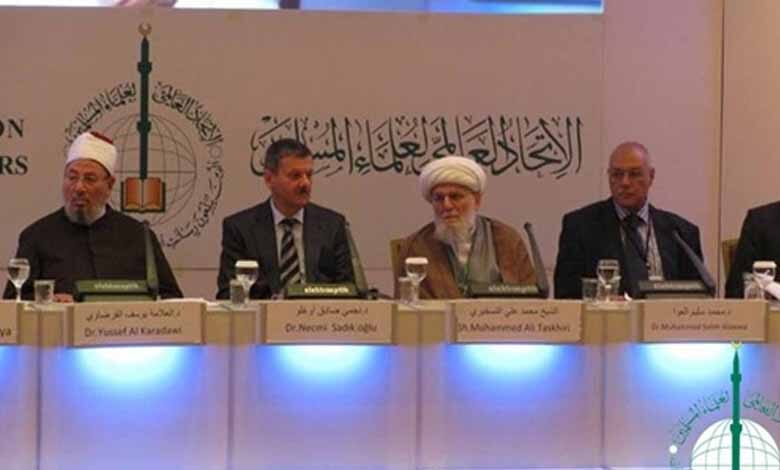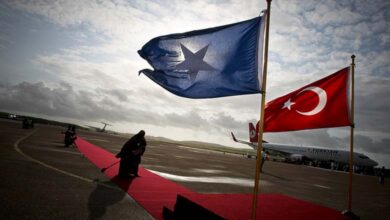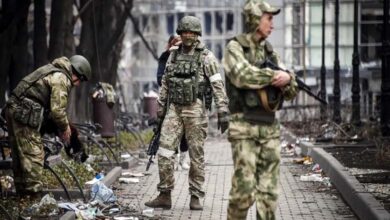Union of Muslim Scholars expiates those who opposed Taliban control of Afghanistan

“Enabling the Taliban to reach power is a divine will to promote Islam and open up a clear front against the occupation of tyrants, and anyone who opposes the Islamic rule adopted by the Taliban has opposed the purposes of Sharia,” the Qatar-based World Federation of Muslim Scholars said in a statement, in a clear affirmation of its bias and support for the terrorist movement after entering the capital Kabul from all sides and controlling most of the Afghan territory.
The statement of the Union of Muslim Scholars shows its contradictory positions on both Tunisia and Afghanistan. It condemned the Tunisian president’s decisions as an illegal coup while welcoming the actions of the Taliban.
Zahra’ Langhi, a member of the Forum for Political Dialog, said: What is the position of the Union of Muslim Scholars regarding what is happening today in Afghanistan? Is it a coup or is it a legitimate right of the Taliban because it falls under the jurisprudence of the conquering Emirate?
On Monday, the regional head of the British Center for Middle East Studies and Research, Amjad Taha, tweeted: You ask me who is behind the Taliban militias?.. The first picture (a statement issued by the Muslim Brotherhood Scholars Union asking the people of Afghanistan to worship the Taliban or to leave Islam), and the second picture (as usual, the terrorist leaders and killers of children and women have exclusive interviews with the Qatar regime channel, Al Jazeera channel only, in reference to the Qatari regime’s support for the Taliban terrorist movement.
Qatar agreement to naturalize Afghans
Several Western and Afghan reports revealed, recently, a US-Qatari agreement, in which Doha pledged to host 2000 Afghans on a preliminary basis, coinciding with the withdrawal of American forces from Afghanistan and the control of the terrorist Taliban movement in the country. Private sources revealed that Qatar will naturalize 500 Afghans each year, providing them with suitable housing, and the Qatari government will bear the expenses related to education and health insurance for them and their families, according to the website Afghans now in Afghanistan and World Review.
According to The World Review, with an agreement between Qatar and the United States, Doha has formally committed to hosting 2000 Afghan families as an initial phase plan, coinciding with the US evacuation of its embassy in Kabul, which the website considered an important agreement because the US will withdraw troops from Afghanistan.
Afghanistan Now reports that the Taliban official in Doha said that Qatar has agreed to naturalize 500 Afghans each year and will provide them with basic facilities like housing, education and health insurance, adding that this agreement was not easy to reach; The Doha commitments came after a very tense meeting in Washington, especially since the Americans accuse Doha of having a peace process and how Qatar failed to monitor its implementation.
Experts say that Qatar will be the biggest winner from the return of the terrorist Taliban to power in Afghanistan, thus investing heavily in betting on the movement, hosting its leadership in Doha and sponsoring negotiations between it and the Afghan government.
The Qatari gains in the Afghan file are further confirmed by countries such as Britain and Russia expressing readiness to establish relations with the new Taliban regime as a prelude to other countries such as the United States, European countries, China and India.
The last thing Doha is clearly thinking about is the human rights issues and the status of women under the Taliban, who have started to impose their hard-line judgments on Afghans. The movement in Takhar province in northern Afghanistan has taken the initiative to impose long beards and guardianship on women.
Observers believe that the Taliban movement, which faced off against opponents with different titles, will work to reward its Qatari friends in the first place, who sheltered and supported it and opened diplomatic channels to it with various major powers, pointing out that the most important gain for Doha is its recognition as a successful peace broker in relation to the Taliban, which might revive its efforts to speak on behalf of Islamist movements in other regions.
Qatari mediation has provided the Taliban with international recognition as a key partner in the peace process and has enabled it to meet with the Americans and make other gains, including the removal of key leaders from Western blacklists and the release of others from Afghan government prisons.
The Taliban is betting on Qatar for the necessary financial support that will allow it to run the country’s affairs after its control of Kabul, an element that will strengthen Qatari weight in Afghanistan, pending the success of the militant movement in reassuring the countries concerned about the Afghan file.












